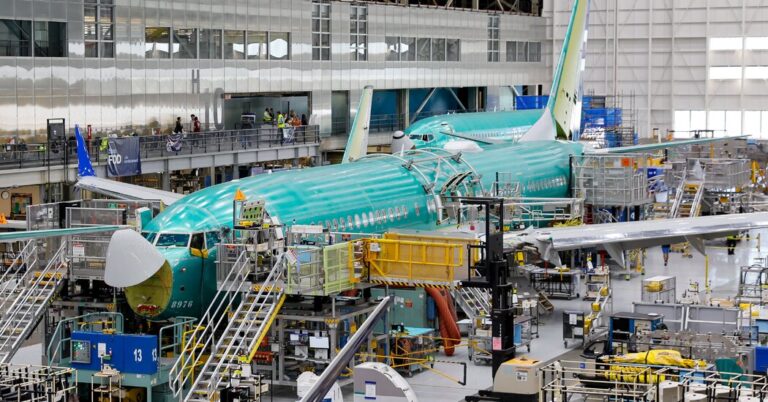The Justice Department plans to allow Boeing to avoid a criminal trial if it pleads guilty to fraud charges stemming from two fatal 737 MAX crashes that occurred more than five years ago, according to two lawyers for families of the crash victims.
Federal officials detailed the proposal in a call with the family Sunday afternoon, according to lawyers Paul G. Cassell and Mark Lindquist, who said the Justice Department has not yet approached Boeing about the deal.
Cassell, the University of Utah law professor, said the terms include a penalty of about $244 million, new investments in safety improvements, three years of monitoring by an outside monitor and meetings with Boeing’s board of directors and the victims’ families.
The Justice Department did not immediately respond to a request for comment, and Boeing declined to comment.
Cassell, who represents more than a dozen family members, said he and the family members called the settlement “outrageous” and far from what they were looking for. He described the proposal as a “sweet plea deal” because it does not require Boeing to admit liability for the deaths of the 346 people who died in the crashes in Indonesia and Ethiopia in late 2018 and early 2019.
“The families will vigorously oppose this plea agreement,” Casell said in a statement. “The memory of the 346 innocent people murdered by Boeing demands more justice than this.”
Casell said the Justice Department plans to inform Boeing of its proposal after the call.
The terms being offered to Boeing would reportedly update a 2021 settlement that resolved criminal charges accusing the aerospace giant of conspiring to defraud the Federal Aviation Administration. Lawyers said the new agreement would require Boeing to plead guilty to the charges.
The 2021 criminal indictment centered on two employees accused of concealing information from the FAA about changes made to software called MCAS that were later found to be linked to the crash.
Under a previous agreement, the company agreed to pay $500 million to the families of those killed and also agreed to pay more than $1.7 billion to customers who missed out on Max deliveries during the plane’s 20-month global grounding.
The Justice Department found in May that Boeing breached the agreement by failing to adequately prevent violations of U.S. fraud laws in its subsequent operations. In a statement at the time, Boeing said it believed it had complied with the terms of its earlier agreement.
As the Justice Department considered how to punish Boeing over the crash, it faced conflicting pressures to hold the company accountable for its failures without harming a company that plays a vital role in the nation’s economy and security.
The 2021 settlement infuriated families of the crash victims who have long argued that Boeing and its executives should face tougher penalties, including public trials. Many of the families have reached civil settlements with the company, but a small number are pursuing civil damages lawsuits scheduled to begin later this year.
In 2022, a Texas jury acquitted former Boeing technical pilot Mark A. Faulkner of defrauding two of the company’s customers, the only federal criminal case brought against an individual linked to the crash.
The Justice Department also opened a criminal investigation into Boeing over a January flight in which a panel blew off on a Max jet operated by Alaska Airlines. No serious injuries were reported, but the incident has reignited concerns from lawmakers and the public about the quality of Boeing jets.
Mark Walker Contributed report.

